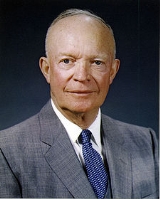
1943 World War II: United States General Dwight D. Eisenhower publicly announces the Allied armistice with Italy.
1943 World War II: U.S. General Dwight D. Eisenhower and Italian Marshal Pietro Badoglio sign an armistice aboard the Royal Navy battleship {{HMS|Nelson|28|6}} off Malta.
1943 World War II: U.S. General Dwight D. Eisenhower becomes the Supreme Allied Commander.
1950 US General Dwight D. Eisenhower becomes supreme commander of NATO-Europe
1952 Dwight D. Eisenhower resigns as Supreme Allied Commander of NATO.
1952 Korean War: U.S. President-elect Dwight D. Eisenhower fulfills a campaign promise by traveling to Korea to find out what can be done to end the conflict.
1953 Dwight D. Eisenhower is inaugurated as the first Republican President in twenty years.
1953 Cold War: U.S. President Dwight D. Eisenhower formally approves the top secret document National Security Council Paper No. 162/2, which states that the United States' arsenal of nuclear weapons must be maintained and expanded to counter the communist threat.
1954 President Dwight D. Eisenhower authorizes the creation of the United States Air Force Academy in Colorado.
1954 President Dwight D. Eisenhower gives his "domino theory" speech during a news conference.
1954 U.S. President Dwight D. Eisenhower signs a bill into law that places the words "under God" into the U.S. Pledge of Allegiance.
1954 Dwight D. Eisenhower pledges United States support to South Vietnam
1954 U.S. President Dwight D. Eisenhower dedicates the USMC War Memorial (Iwo Jima memorial) in Arlington National Cemetery.
1956 U.S. President Dwight D. Eisenhower announces to the nation that he is running for a second term.
1956 A joint resolution of the U.S. Congress is signed by President Dwight D. Eisenhower, authorizing ''In God We Trust'' as the U.S. national motto.
1957 President Dwight D. Eisenhower sends 101st Airborne Division troops to Little Rock, Arkansas, to enforce desegregation.
1957 U.S. President Dwight D. Eisenhower apologizes to the finance minister of Ghana, Komla Agbeli Gbdemah, after he is refused service in a Dover, Delaware restaurant.
1958 U.S. President Dwight D. Eisenhower signs the Alaska Statehood Act into law.
1958 U.S. President Dwight D. Eisenhower signs into law the National Aeronautics and Space Act, which creates the National Aeronautics and Space Administration (NASA).
1959 President Dwight D. Eisenhower signs a bill into law allowing for Hawaiian statehood, which would become official on August 21.
1959 President Dwight D. Eisenhower signs an executive order proclaiming Hawaii the 50th state of the union. Hawaii's admission is currently commemorated by Hawaii Admission Day
1959 President Dwight D. Eisenhower signs an executive order transferring Wernher von Braun and other German scientists from the United States Army to NASA.
1960 U.S. President Dwight D. Eisenhower signs the National Security Council directive on the anti-Cuban covert action program that will ultimately lead to the Bay of Pigs Invasion.
1960 Nikita Khrushchev demands an apology from U.S. President Dwight D. Eisenhower for U-2 spy plane flights over the Soviet Union thus ending a Big Four summit in Paris.
1961 President Dwight D. Eisenhower delivers a televised farewell address to the nation three days before leaving office, in which he warns against the accumulation of power by the "military-industrial complex".
1962 {{Ship|NS|Savannah}}, the first nuclear-powered cargo-passenger ship, is launched as a showcase for Dwight D. Eisenhower's ''Atoms for Peace'' initiative.
1962 Cuban Missile Crisis: US President John F. Kennedy, after internal counsel from Dwight D. Eisenhower, announces that American reconnaissance planes have discovered Soviet nuclear weapons in Cuba, and that he has ordered a naval "quarantine" of the Communist nation.

